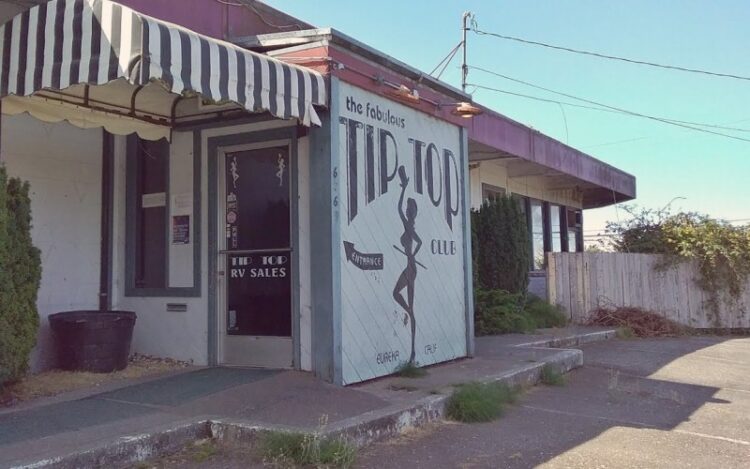If you’ve ever orchestrated trade-offs in the Bay or ventured into shadowy transactions in Humboldt prior to 2018, chances are high that at some point, you conducted business in the parking lot of Tip Top, the sole strip club in the Emerald Triangle. This venue served as the unofficial gathering place of The Hill—a moniker fondly used for the verdant, cannabis-rich mountains of Northern California.
This distinctive building became a popular haunt for solitary farmers and trimmers, serving as an informal marketplace before marijuana legalization and a secretive haven for its performers. Nestled on a scenic overlook at the intersection of Highway 101 and Salmon Creek Road in Eureka, its large transparent windows narrate a benign tale to the casual observer, yet those familiar with its history know the true stories encapsulated within its walls.
The Inception
The inception of Tip Top in 1997 saw its founder, Tom, affectionately known as T. Great Razooly, cleverly navigating through zoning and licensing restrictions by categorizing the establishment as an RV dealership. Veteran dancer Jasmine mentioned, “all of us were officially RV sales agents, and a miniature toy RV was perennially perched on Tom’s desk.” After securing a legitimate license, the club was eventually acquired by a former dancer known as Sassy in the early 2000s.
The club attracted a diverse crowd ranging from “country folk to bohemians, and blends of both,” according to dancer Miraya. Growing up in Humboldt with family ties to both cannabis cultivation and the milling industry, she witnessed the regional economic transition from logging to cannabis cultivation firsthand. “The loggers weren’t fond of the growers initially, but economic necessities bred acceptance. Camouflage apparel became a symbol of their reluctant solidarity,” she chuckled.
A Surprising Fortune
Tip Top’s clandestine fame as a lucrative spot was well-known among the underground dancers, despite the cultural adjustment for those coming from cities like San Diego or Atlanta. Honey, who migrated from Atlanta on a recommendation, observed, “The clients were an odd mix of rugged individuals, not particularly glamorous but genuine. My first night, every man at the bar requested dances, netting me a surprising $4,200 in just a few days.”
Autumn, who relocated from San Diego, shared similar stories of unexpected financial windfalls, “One Halloween weeknight, a customer named Blake lavished us with countless hundreds. I pocketed over $6,000 that night alone. Blake, if you’re out there, you’re still a legend among us.”
Alternative Currency
It wasn’t just cash that changed hands; several dancers were compensated with cannabis, which was often more valuable than money. “Customers knew I’d accept marijuana as payment. What would be $100 in cash could be half an ounce in weed,” Miraya recalled, reminiscing about popular strains like Trainwreck and Purple Urkle.
Honey added, “One regular patron essentially funded our dance studio by donating $1,000 weekly for five weeks after learning it would feature cannabis-themed classes.”
Refuge for Solitary Souls
Most patrons frequented Tip Top not just for transactions but for a break from the isolation prevalent in The Hill. “Many were lonely cultivators who hadn’t seen a woman for months and were eager for company,” Jasmine noted. Autumn likened their interactions to therapy sessions, “It was less about dancing and more about providing companionship and a listening ear.”
The Decline
As the old adage goes, all good things come to an end. Miraya lamented the decline of Humboldt’s storied cannabis culture with the advent of legalization, “I departed around 2014-2015, just as the tide was turning with legalization in other states. The vibrant culture that defined us faded rapidly.”
Legalization coupled with wildfires has transformed the landscape, mirroring the club’s dwindling fortunes. “New dancers think $200 is good money, but they don’t realize how the scene has changed,” Honey expressed sorrowfully. “Among all the growers I knew, only a couple still cultivate.”
“My regular, the backbone of our studio, now works as a bartender. Despite buying a home, that’s all he has left from his farming days,” she concluded.









